Find Help
More Items From Ergsy search
-

Redundancy Coaching Couch 1: Redundancy and Presuppositions
Relevance: 100%
-

Redundancy Coaching Couch 7: Redundancy and Judgement.MTS
Relevance: 51%
-

Redundancy Coaching Couch 4:Redundancy and Language
Relevance: 51%
-

Redundancy Coaching Couch 5: Redundancy and Feedback.MTS
Relevance: 51%
-

Redundancy Coaching Couch 2: Redundancy and Passion
Relevance: 50%
-

Redundancy Crusader and Annabel Kaye on communications in redundancy (5).MTS
Relevance: 49%
-

Redundancy Crusader and Annabel Kaye on scope and scale of redundancy (3).MTS
Relevance: 48%
-

Redundancy Crusader and Annabel Kaye on the Current Model of Redundancy (1).MTS
Relevance: 48%
-

Redundancy Crusader and Annabel Kaye on making redundancy a better experience (2).MTS
Relevance: 47%
-

What is the primary purpose of redundancy?
Relevance: 46%
-

What are the legal requirements for redundancy in the UK?
Relevance: 46%
-

What is the primary purpose of redundancy?
Relevance: 46%
-

What are the legal requirements for redundancy in the UK?
Relevance: 46%
-

How is redundancy pay calculated in the UK?
Relevance: 46%
-

Redundancy Coaching Couch 3: States
Relevance: 46%
-
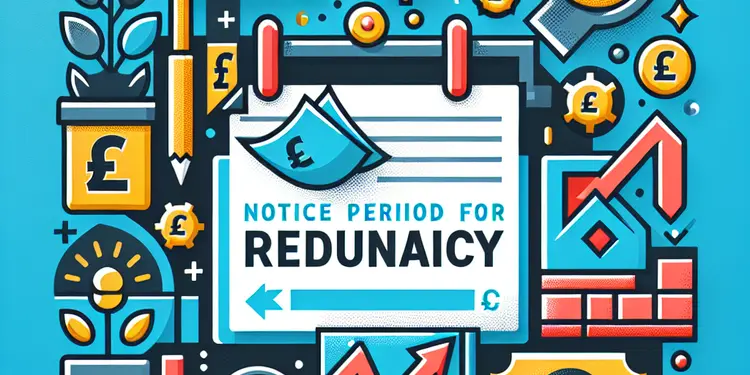
What is the notice period for redundancy?
Relevance: 45%
-

What is redundancy pay and who is eligible for it?
Relevance: 45%
-

What is redundancy pay and who is eligible for it?
Relevance: 45%
-
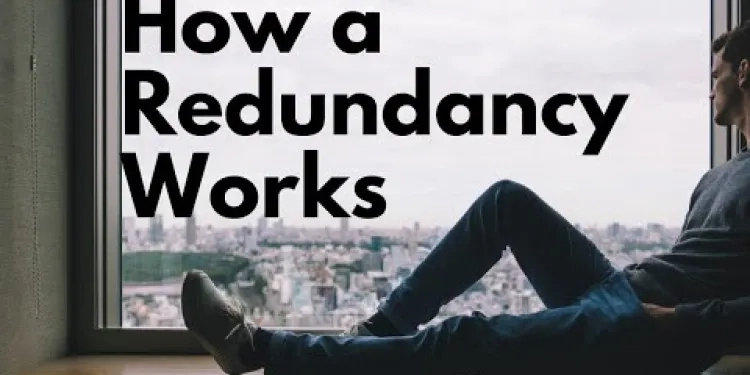
HOW A REDUNDANCY WORKS - General Information
Relevance: 45%
-
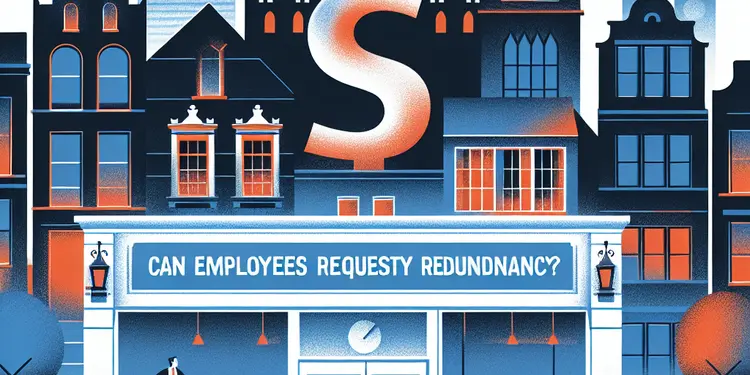
Can employees request voluntary redundancy?
Relevance: 45%
-

What is a fair selection process for redundancy?
Relevance: 44%
-

Can an employee appeal a redundancy decision?
Relevance: 44%
-

What is the role of trade unions in the redundancy process?
Relevance: 43%
-
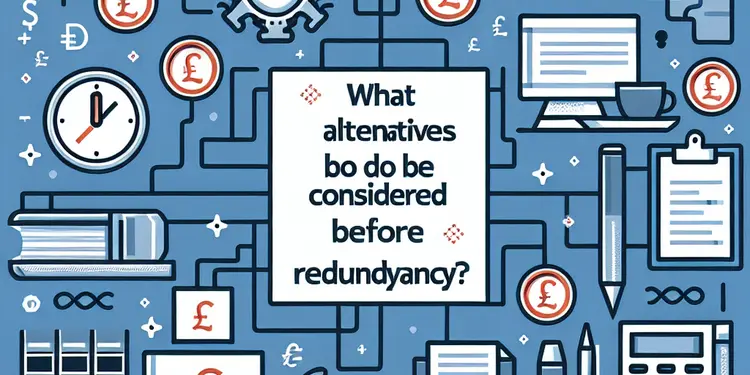
What alternatives should be considered before redundancy?
Relevance: 42%
-
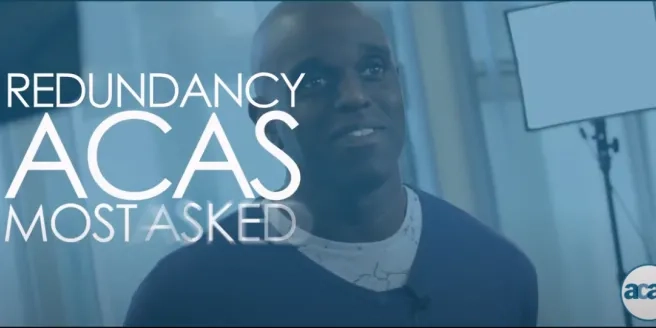
Frequently asked questions about redundancy from ACAS
Relevance: 42%
-
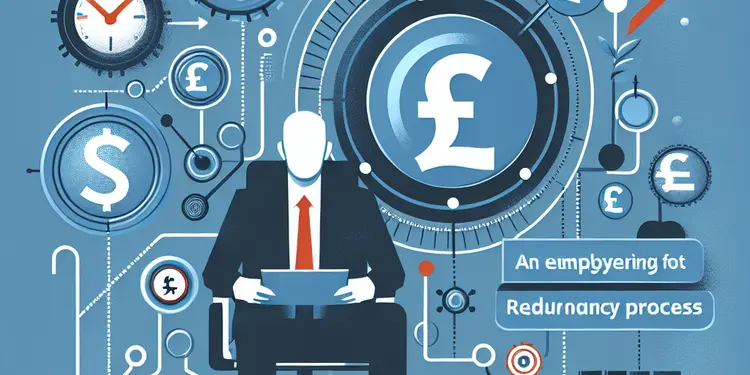
What happens if an employer does not follow the redundancy process?
Relevance: 42%
-

Are there any protections for employees on maternity leave during redundancy?
Relevance: 42%
-

What support can employees expect during redundancy?
Relevance: 41%
-
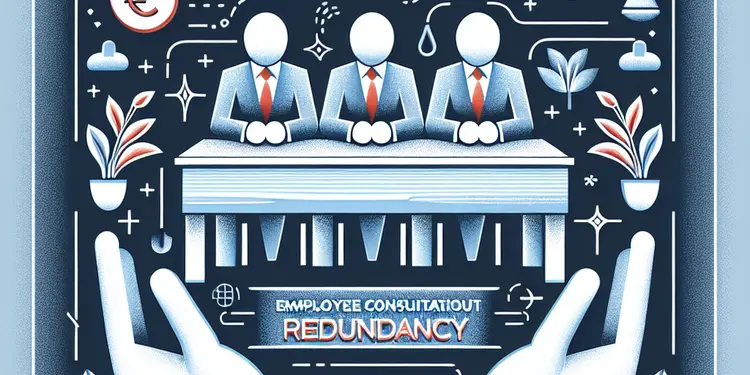
How should companies consult employees about redundancy?
Relevance: 41%
-

How should companies consult employees about redundancy?
Relevance: 41%
-

How should employers manage the emotional impact of redundancy on employees?
Relevance: 40%
-

Understanding Your Rights: Legal Support for Families During Economic Turbulence
Relevance: 14%
-
Do new variants affect COVID-19 testing?
Relevance: 9%
-

What is the deadline for filing a tribunal application?
Relevance: 7%
-

Upcoming Changes to Parental Leave Policies in the UK
Relevance: 6%
-

Why did I receive a tax refund letter from HMRC?
Relevance: 6%
-

What if my circumstances change?
Relevance: 6%
-

Am I considered an employee if I am a gig worker?
Relevance: 6%
-

Is job security a right for gig workers?
Relevance: 6%
-

What is a food bank?
Relevance: 6%
Avoid making presuppositions about redundancy
Try to shake off any presuppositions you may have about redundancy as they can be detrimental for several reasons.
- Undermining Objectivity:
- Presuppositions can introduce bias and subjectivity into discussions by shaping the lens through which information is interpreted. This undermines the pursuit of objective truth and reasoned analysis.
- Impeding Open-Mindedness:
- Presuppositions can limit open-mindedness by predisposing individuals to predetermined beliefs. This hinders the ability to consider alternative perspectives and impedes intellectual growth.
- Obstructing Effective Communication:
- When individuals operate with different presuppositions, effective communication becomes challenging. Misunderstandings arise as parties may be talking past each other without a shared foundation for dialogue.
- Inhibiting Critical Thinking:
- Relying on presuppositions may discourage critical thinking, as individuals may accept ideas without questioning their validity. This hampers the development of analytical skills and the ability to evaluate information critically.
- Fostering Confirmation Bias:
- Presuppositions can contribute to confirmation bias, where individuals seek or interpret information in a way that confirms their existing beliefs. This reinforces preconceived notions and inhibits a balanced consideration of diverse viewpoints.
Redundancy Coaching Couch 1: Redundancy and Presuppositions
Understanding Redundancy
Redundancy is a term that many in the United Kingdom may encounter throughout their careers, especially during times of economic uncertainty. It refers to a situation where an employer reduces their workforce because a particular job or role is no longer necessary, either due to changes within the company, technological advancements, or shifts in market demand. While redundancy can be a challenging experience, it also provides an opportunity for individuals to reassess their careers, develop new skills, and consider different professional pathways.The Impact of Presuppositions
Presuppositions are the underlying assumptions or beliefs that we hold, often unconsciously. In the context of redundancy, presuppositions can significantly influence how individuals perceive and respond to their situation. For instance, someone may presuppose that redundancy is always negative or that it reflects their personal failure. Such beliefs can lead to feelings of inadequacy, anxiety, and a lack of motivation to pursue new opportunities.Redundancy Coaching: Shifting Perspectives
Redundancy coaching focuses on helping individuals to recognize and challenge their presuppositions, allowing them to adopt a more positive and constructive mindset. Coaches work with individuals to identify the presuppositions that may be hindering their progress and to reframe these beliefs in a way that promotes resilience and empowerment. By addressing these underlying assumptions, individuals can better manage the emotional and psychological impacts of redundancy and navigate their career transitions more effectively.Actionable Strategies
Some strategies that redundancy coaches might employ include: 1. **Reflective Questioning:** Coaches ask reflective questions that encourage individuals to consider alternative perspectives and challenge their existing beliefs. For example, "What opportunities could arise from this change?" or "How can this experience contribute to your long-term career goals?" 2. **Goal Setting:** Setting clear, achievable goals can provide a sense of direction and purpose. Coaches help individuals to define their career aspirations and develop a strategic plan for achieving them. 3. **Skill Development:** Focusing on acquiring new skills or further developing existing ones can increase employability and open up new career opportunities. Coaches may guide individuals toward relevant training or certification programs. 4. **Building Resilience:** Developing resilience is crucial for adapting to change. Coaches might use techniques such as mindfulness, stress management, and positive thinking to bolster an individual’s ability to cope with redundancy.Conclusion
Redundancy does not have to be the end of the road. With the right support and a shift in perspective, individuals can transform this challenging experience into an opportunity for growth and development. By addressing presuppositions and adopting a proactive approach, redundancy coaching can empower individuals to rediscover their potential and embark on a new, fulfilling career path.Don't Assume Things About Losing a Job
Try not to make assumptions about losing a job. These assumptions can cause problems.
- Thinking Clearly:
- Assumptions can make it hard to see things clearly. They can change how we understand information and make it hard to know the real truth.
- Keeping an Open Mind:
- Assumptions can stop us from having an open mind. They can make us stick to our old beliefs. This makes it hard to think about new ideas and learn new things.
- Talking Well with Others:
- When we have different assumptions, it can be hard to talk to each other. We might misunderstand each other because we don't share the same ideas.
- Thinking Critically:
- Assumptions can stop us from thinking critically. If we don't question our ideas, we don't get better at thinking and figuring things out.
- Avoiding Only Seeing What We Want:
- Assumptions can make us see only what we already believe. This means we might ignore other important ideas and only pay attention to what we like.
Tips to Help: Use tools like simple words and pictures to understand better. Talk to others and ask questions. This helps see things in a new way.
Redundancy Coaching Couch 1: Redundancy and Beliefs
Understanding Redundancy
Redundancy means losing your job because your work is no longer needed. This can happen if a company changes the way it works, uses new technology, or if customer needs change. A lot of people in the UK might experience redundancy during their job life. Even though it can be tough, it also gives you a chance to think about your career, learn new skills, and try something different.How Beliefs Affect Us
Beliefs are ideas we have about things, sometimes without even knowing it. When you lose your job, your beliefs can change how you feel and react. For example, you might think redundancy is always bad or that it’s your fault. Believing this can make you feel sad, worried, or less willing to try new things.Redundancy Coaching: Looking at Things a New Way
Redundancy coaching helps you see things in a better way. A coach helps you spot beliefs that might stop you from moving forward. They help you change these beliefs to make you feel strong and ready for new challenges. By working on your beliefs, you can handle losing a job better and find new jobs more easily.Actions You Can Take
Here are some ideas that coaches might suggest: 1. **Think and Reflect:** Coaches ask questions that help you think differently. They might ask, "What good things can come from this change?" or "How can this help you reach your career dreams?" 2. **Set Goals:** Making small, clear goals can help you know what to do next. Coaches help you figure out what you want in your career and how to get there. 3. **Learn New Skills:** Learning new things or improving the skills you have can help you find new jobs. Coaches can guide you to training or courses that suit you. 4. **Be Strong:** It’s important to be strong when things change. Coaches might teach you ways to stay calm and think positively. This helps you handle job loss better.Conclusion
Losing a job doesn’t have to mean the end. With help and a new way of thinking, you can turn this tough time into a chance to grow and learn. By working on your beliefs and taking action, redundancy coaching can help you find a new and exciting job path.Frequently Asked Questions
What is redundancy?
Redundancy is a form of dismissal from your job, caused by your employer needing to reduce the workforce. It can happen for several reasons, including company closure, the role no longer being needed, or needing fewer employees for particular roles.
What are the rules for redundancy?
Redundancy rules vary depending on your contract and the length of your employment. Generally, your employer is required to follow a fair process, provide appropriate notice, and offer redundancy pay if you've been with the company for two years or more.
How is redundancy pay calculated?
Statutory redundancy pay is based on your age, weekly pay, and the number of years you've worked for your employer. The basic calculation is 0.5 week’s pay for each complete year of service under age 22, 1 week’s pay for each complete year of service between age 22 and 41, and 1.5 week’s pay for each complete year of service over age 41.
What are my rights during redundancy?
During redundancy, you have the right to a fair process, which includes consultation with your employer, being considered for any alternative roles within the company, and receiving redundancy pay if eligible.
Can I challenge my redundancy?
Yes, you can challenge your redundancy if you believe the selection process was unfair, you weren't properly consulted, or you weren't offered suitable alternative employment. Initially, you should raise your concerns with your employer. If unresolved, you might consider legal advice or contacting an employment tribunal.
What is a consultation period?
A consultation period is a time when your employer discusses the impending redundancy with you. For 20 or more redundancies, it must last at least 30 days, and for 100 or more redundancies, at least 45 days. The aim is to explore ways to avoid redundancies, reduce the number of job losses, and mitigate the consequences.
What is suitable alternative employment?
Suitable alternative employment refers to another role within the organization that is appropriate for your skillset and experience. If available, your employer should offer you this position when making redundancies.
Do I have to accept suitable alternative employment?
You can refuse suitable alternative employment if you believe it isn’t appropriate for various reasons, such as a significant change in terms and conditions. However, refusal might affect your redundancy pay unless you have a valid reason.
What are my entitlements if I am made redundant while on maternity leave?
If you are made redundant while on maternity leave, you still have the same rights, including the right to consultation, redundancy pay, and the right to be offered suitable alternative employment if available before other employees.
Can I be made redundant while on sick leave?
Yes, you can be made redundant while on sick leave, but your employer must follow the same fair process, provide appropriate notice, and offer any redundancy pay you are entitled to.
What is PILON?
PILON stands for Payment in Lieu of Notice. It means your employer can pay you for your notice period rather than requiring you to work through it. This payment should be in your employment contract or mutually agreed between you and your employer.
Can my employer ask me to work during my notice period after redundancy?
Yes, your employer can ask you to work during your notice period after redundancy. If you are still employed during this time, you have the right to your usual salary and benefits.
What is voluntary redundancy?
Voluntary redundancy is when employees choose to be made redundant, usually in exchange for a financial incentive. It’s often offered as an alternative to compulsory redundancy, allowing those who volunteer to leave and often receive an enhanced redundancy package.
What does 'at risk of redundancy' mean?
'At risk of redundancy' means your job might be made redundant. It signals that you should prepare for the possibility, but a formal decision has not yet been made.
How can redundancy coaching help me?
Redundancy coaching can help you navigate the redundancy process, offering support in understanding your rights, exploring new career options, improving your employability, and managing the emotional impact of job loss.
What does redundancy mean?
Redundancy means losing your job because your boss needs to have fewer workers. This can happen if the company closes, they don't need your job anymore, or they just need fewer people to do certain jobs.
What are the rules for losing your job?
Sometimes a company has to let people go. This is called redundancy. There are rules to make sure it is fair.
✦ Your company must give you notice. This means they tell you before you lose your job.
✦ They should also give you money called a "redundancy payment" if you worked there a long time.
✦ Your company must be fair when choosing who to let go. They should not just choose people they don't like.
To better understand this, you can:
- Ask someone to explain these rules using simple words.
- Use a computer tool that reads text out loud for you.
- Watch videos for more information.
Redundancy rules can be different for each person. It depends on your contract and how long you have worked there. Most of the time, your boss must do three things:
- Be fair in the process.
- Tell you in advance.
- Give you redundancy pay if you've worked for them for two years or more.
How do you work out redundancy pay?
Getting money when you lose your job is called statutory redundancy pay. This money depends on your age, how much money you make each week, and how long you have worked there.
- If you are younger than 22, you get half a week's pay for each year you worked.
- If you are between 22 and 41 years old, you get one week's pay for each year you worked.
- If you are older than 41, you get one and a half weeks' pay for each year you worked.
Tools like a calculator or asking someone to help can make it easier to understand.
What are my rights if I lose my job?
When a company lets people go, they must be fair. Here’s what that means:
- Your boss should talk to you about it.
- They should see if there are other jobs at the company you can do.
- If you qualify, you should get some money when you leave.
You can use tools like a calendar to keep track of meetings. It might help to write down your questions before talking to your boss.
Can I say 'no' to losing my job?
You can say "no" to losing your job if you think it wasn't fair. This might be because you were not chosen the right way, the boss did not talk to you enough, or you were not given another job.
First, talk to your boss about your worries.
If they do not help, you can ask a lawyer or a work tribunal for help.
What is a consultation period?
A consultation period is a special time.
During this time, people talk about changes at work or school.
They listen to everyone's ideas and feelings.
Tools like pictures or charts can help understand this better.
A consultation period is a time when your boss talks to you about upcoming job cuts. If 20 or more people might lose their jobs, this talking time must be at least 30 days. If 100 or more people might lose their jobs, it must be at least 45 days. The goal is to find ways to prevent job cuts, lessen the number of people losing jobs, and help everyone with the changes.
What is a good job for someone else?
Suitable alternative employment means a new job in the same company that matches your skills and experience. If this job is available, your boss should offer it to you if your current job is ending.
Do I need to take another job if it is offered?
You can say no to a new job if you think it isn't right for you. This might be because the job rules are very different. But if you say no, it might change the money you get when you leave your job. Make sure you have a good reason to say no.
Ask for help if you need it. Talking to someone you trust or using tools like a dictionary can help you understand better.
What can I get if I lose my job while on maternity leave?
If you lose your job while you are on maternity leave, you still have important rights. You should talk to your employer about what is happening. You can get money if you are made redundant, and if there is another job you can do, they should offer it to you first before other workers.
Can I lose my job while I am off sick?
If you are away from work because you are sick, you might worry about your job. Here is some simple advice to help you understand:
- If your company is making changes and letting people go, they might think about all staff, even those who are sick.
- It is important that your company treats everyone fairly, including people who are sick.
Here are some tips to help you:
- Ask someone you trust to explain what is happening at work.
- Use pictures or simple diagrams to understand what is going on.
- Write down any questions you have or ask a friend to help you ask them.
You can lose your job because of redundancy, even if you are off work sick. But your boss must be fair. They need to give you enough notice and pay you any money you should get.
What is PILON?
PILON stands for "Principles of International Law Organisations Network".
This is a group of countries that work together on law issues.
If you find this hard to read, you can ask someone for help or use an audio reader tool.
PILON means your boss can pay you instead of you working your notice time. This is called Payment in Lieu of Notice. Your job papers should say this, or you and your boss should agree on it together.
Can my boss ask me to work after I lose my job?
Yes, your boss can ask you to work while you wait to leave your job. This is called a "notice period." During this time, you can still get your normal pay and benefits.
If you find reading hard, you can use tools to help. You might like audiobooks or text-to-speech apps. These can read the text aloud to you. Highlighting important words or using a ruler to keep your place can also help.
What is voluntary redundancy?
Voluntary redundancy is when your job ends because there is not enough work. Your boss asks if anyone wants to leave the job. You can choose to leave and usually get some money for it.
If you find it hard to read, you can try these tips:
- Read with a friend or family member.
- Listen to the text using a voice-reading app.
- Use a dictionary to look up words you don't understand.
Voluntary redundancy is when people decide to stop working at their job. They choose to leave and get some extra money for leaving. This is different from being told you have to leave. People who choose to leave usually get more money than if they were told to go.
If reading is hard, here are some things that might help: using larger text, having someone read it out loud, or using audio books. These can make it easier to understand and remember.
What does 'at risk of redundancy' mean?
'At risk of redundancy' means you might lose your job soon. Your boss thinks they might not need your job anymore. You might need to find a new job.
If you feel worried or confused, it's good to talk to someone you trust. They can help explain things. You can also use simple tools like drawings or charts to understand better.
'At risk of redundancy' means you might lose your job soon. It tells you to get ready, but no final decision has been made yet.
How can coaching help if I am losing my job?
Redundancy coaching can help you when you lose your job. It can support you to understand your rights, look for new job options, get better at finding a job, and deal with the feelings you have about losing your job.
Useful Links
Have you found an error, or do you have a link or some information you would like to share? Please let us know using the form below.
-->
This website offers general information and is not a substitute for professional advice.
Always seek guidance from qualified professionals.
If you have any medical concerns or need urgent help, contact a healthcare professional or emergency services immediately.
Some of this content was generated with AI assistance. We’ve done our best to keep it accurate, helpful, and human-friendly.
- Ergsy carfully checks the information in the videos we provide here.
- Videos shown by Youtube after a video has completed, have NOT been reviewed by ERGSY.
- To view, click the arrow in centre of video.
- Most of the videos you find here will have subtitles and/or closed captions available.
- You may need to turn these on, and choose your preferred language.
- Go to the video you'd like to watch.
- If closed captions (CC) are available, settings will be visible on the bottom right of the video player.
- To turn on Captions, click settings .
- To turn off Captions, click settings again.
More Items From Ergsy search
-

Redundancy Coaching Couch 1: Redundancy and Presuppositions
Relevance: 100%
-

Redundancy Coaching Couch 7: Redundancy and Judgement.MTS
Relevance: 51%
-

Redundancy Coaching Couch 4:Redundancy and Language
Relevance: 51%
-

Redundancy Coaching Couch 5: Redundancy and Feedback.MTS
Relevance: 51%
-

Redundancy Coaching Couch 2: Redundancy and Passion
Relevance: 50%
-

Redundancy Crusader and Annabel Kaye on communications in redundancy (5).MTS
Relevance: 49%
-

Redundancy Crusader and Annabel Kaye on scope and scale of redundancy (3).MTS
Relevance: 48%
-

Redundancy Crusader and Annabel Kaye on the Current Model of Redundancy (1).MTS
Relevance: 48%
-

Redundancy Crusader and Annabel Kaye on making redundancy a better experience (2).MTS
Relevance: 47%
-

What is the primary purpose of redundancy?
Relevance: 46%
-

What are the legal requirements for redundancy in the UK?
Relevance: 46%
-

What is the primary purpose of redundancy?
Relevance: 46%
-

What are the legal requirements for redundancy in the UK?
Relevance: 46%
-

How is redundancy pay calculated in the UK?
Relevance: 46%
-

Redundancy Coaching Couch 3: States
Relevance: 46%
-

What is the notice period for redundancy?
Relevance: 45%
-

What is redundancy pay and who is eligible for it?
Relevance: 45%
-

What is redundancy pay and who is eligible for it?
Relevance: 45%
-

HOW A REDUNDANCY WORKS - General Information
Relevance: 45%
-

Can employees request voluntary redundancy?
Relevance: 45%
-

What is a fair selection process for redundancy?
Relevance: 44%
-

Can an employee appeal a redundancy decision?
Relevance: 44%
-

What is the role of trade unions in the redundancy process?
Relevance: 43%
-

What alternatives should be considered before redundancy?
Relevance: 42%
-

Frequently asked questions about redundancy from ACAS
Relevance: 42%
-

What happens if an employer does not follow the redundancy process?
Relevance: 42%
-

Are there any protections for employees on maternity leave during redundancy?
Relevance: 42%
-

What support can employees expect during redundancy?
Relevance: 41%
-

How should companies consult employees about redundancy?
Relevance: 41%
-

How should companies consult employees about redundancy?
Relevance: 41%
-

How should employers manage the emotional impact of redundancy on employees?
Relevance: 40%
-

Understanding Your Rights: Legal Support for Families During Economic Turbulence
Relevance: 14%
-
Do new variants affect COVID-19 testing?
Relevance: 9%
-

What is the deadline for filing a tribunal application?
Relevance: 7%
-

Upcoming Changes to Parental Leave Policies in the UK
Relevance: 6%
-

Why did I receive a tax refund letter from HMRC?
Relevance: 6%
-

What if my circumstances change?
Relevance: 6%
-

Am I considered an employee if I am a gig worker?
Relevance: 6%
-

Is job security a right for gig workers?
Relevance: 6%
-

What is a food bank?
Relevance: 6%


